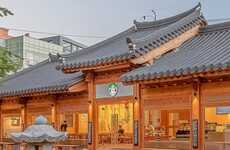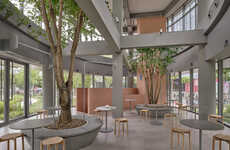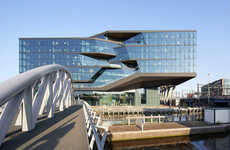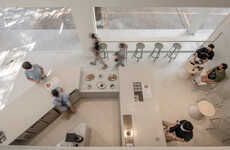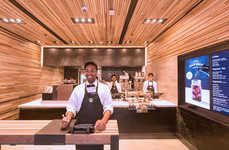
The Starbucks Amsterdam Rembrandtplein is Dynamically Designed
Jana Pijak — March 8, 2012 — Art & Design
The Starbucks Amsterdam Rembrandtplein is designed by Liz Muller & Starbucks Coffee. A contemporary and vibrant take on the classic franchise design, this stunning coffee house is constructed from a number of cubed wooden blocks.
Serving as Starbucks' first European concept shop, this cool coffee house is filled with reclaimed and recycled furnishings and local art. Located in a former bank vault space, this spatial cafe pays homage to Dutch culture.
From a cookie mould wall to thousands of building block accents, this bold interior strays aways from traditional design, paving way for imaginative and personality filled public design concepts. Built to meet Leed sustainable building guidelines, the eco-friendly Starbucks Amsterdam Rembrandtplein works to conserve water and reduce energy consumption.
Serving as Starbucks' first European concept shop, this cool coffee house is filled with reclaimed and recycled furnishings and local art. Located in a former bank vault space, this spatial cafe pays homage to Dutch culture.
From a cookie mould wall to thousands of building block accents, this bold interior strays aways from traditional design, paving way for imaginative and personality filled public design concepts. Built to meet Leed sustainable building guidelines, the eco-friendly Starbucks Amsterdam Rembrandtplein works to conserve water and reduce energy consumption.
Trend Themes
1. Sustainable Design - The use of reclaimed and recycled furnishings and eco-friendly building guidelines presents opportunities for businesses to incorporate sustainable design in their spaces.
2. Art-inspired Interiors - The incorporation of local art and bold interior design elements like the cookie mould wall opens up possibilities for businesses to create unique and inspiring spaces.
3. Reimagining Traditional Spaces - The transformation of a former bank vault into a vibrant coffee house showcases the potential for businesses to repurpose and reimagine traditional spaces in innovative ways.
Industry Implications
1. Hospitality - Hotels, restaurants, and cafes can utilize sustainable design and art-inspired interiors to create memorable experiences for their guests.
2. Retail - Retail stores can explore the concept of reimagining traditional spaces to create immersive and visually appealing shopping environments.
3. Commercial Real Estate - Commercial real estate developers and property owners can adopt sustainable design practices and innovative interior concepts to increase the value and appeal of their properties.
6.6
Score
Popularity
Activity
Freshness


